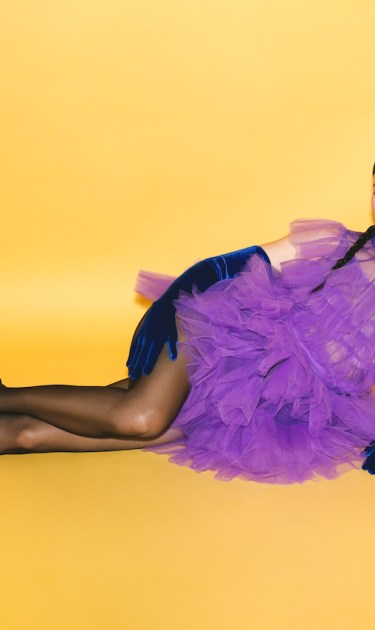On her latest record, Vida Tan Bonita, Chilean-American singer, poet, and multi-instrumentalist Francisca Valenzuela is advocating for us to seize those moments of joy, no matter how big or small they may appear to be on the surface. “I think it’s definitely a tool of survival to enjoy life,” she shares over a Zoom call with Remezcla. “It’s something I think about a lot because I’ve personally been going through lots of changes. I struggle a lot with anxiety. I had OCD for a while. I was really depressed… I had a lot of things that made it difficult to be happy with myself and [with] life.”
It’s been a journey, Valenzuela says. But lately, she’s been practicing leading with curiosity and being grateful for whenever she has found joy, whether it has come in the form of a nourishing conversation or getting to explore a new city. The sense of wanting to keep those joyous moments alive is a sentiment that echoes throughout Vida Tan Bonita, where she also writes through the bittersweet with the same kind of fervor. The album boasts plenty of new sonic territory for Valenzuela, where she incorporates splashes of technicolor techno-cumbia, warm lap steel-guitar slides, saxophones, and clarinets. But it simultaneously holds the same glow of the more intimate piano-based songwriting that kick-started her career with the release of 2007’s Muérdete La Lengua.
On Vida Tan Bonita’s soaring, distorted guitar-driven opener “Se Va,” Valenzuela pays homage to her parents through a set of open and honest validations and reflections: “Fui una semilla que creció en tu jardín,” “Yo salí al mundo y de tu mano me solté/Ya nadé profundo y por tu abrazo regresé,” “Es la que vida se da/Es la vida que se va.” It exudes a newfound appreciation for life and those around you who’ve worked hard at sustaining it, knowing it can all slip away at any moment.
Valenzuela mentions that she spent much of her time in the first round of pandemic lockdowns reconnecting with the music that soundtracked her early teenage years: Argentinian art rocker Charly García’s decades-spanning catalog, Tejana queen Selena’s stadium-sized anthems, and the multi-platinum-studded melodies of Thalia, Paulina Rubio, and the Spice Girls. Vida Tan Bonita, in turn, is hued with women-led ‘90s and early 2000’s pop surrealism and neon queen boldness (take the synthy and uptempo “Castillo De Cristal,” for example). It also harkens back to that key musical moment in its overall spirit, by what Valenzuela describes as the desire to feel free, colorful, and feminine.

“Each of these artists were really opening new territory on different fronts, whether it was in [their] aesthetic, empowerment, joy, sexuality or sensuality,” Valenzuela says. Growing up, she found these particular front-and-center displays of freedom exciting, especially given how many of the cultural conversations at the time failed to acknowledge how men in music were immune to public scrutiny for simply expressing themselves.
“I’m thinking of Shakira, Ely Guerra, or Julieta [Venegas]. The fact that they were telling these stories about themselves, whether it was about jealousy, desire, envy, inadequacy, what their day-to-day was like… That was always a really important factor in any kind of art I loved — that power of identification.”
On the rumbly and riotous “Hola Impostora,” Valenzuela grapples with imposter syndrome and its various manifestations of self-sabotage. The track features all-star cameos from musicians like longtime Elvis Costello collaborator and drummer Pete Thomas and bassist Camilla Charlesworth, a current member of indie rock feminist icon Kim Gordon’s touring band, as she tackles those feelings of inadequacy. Despite the ongoing inner turmoil, Valenzuela ultimately silences the trickery of self-doubt through a number of affirmations and clapbacks: “Sal de mi cabeza/Ya no quiero creer/Que soy insuficiente y los demás pueden ver,” “Te pueden aplastar o convertir en diamante/Yo puedo ver que yo sí soy brillante”

“Songs have [the] power of telling a story from a point of view or truth that can be transformative. They all have this impulse and need to make noise & reveal something, even if it is something that is difficult… You don’t really know where it will take you.”
Its messaging aligns with Valenzuela’s work as the founder and creator of the feminist music festival, international community, and collaborative multi-disciplinary platform known as RUIDOSA. She notes that its inception not only came from the desire to foster a more inclusive and equitable Latine music industry that encouraged as much participation from women as possible, but also from the need to connect the shared experiences among women and marginalized peoples creating music in a way that placed value on the power of storytelling.
“Songs also have that power of telling a story from a point of view or truth that can be transformative,” she says. “They all have this impulse and need to make noise and reveal something, even if it is something that is difficult, painful or challenging, or confusing, and you don’t really know where it will take you.”
On the wistful “Vida Tan Bonita,” Valenzuela delivers a confessional ballad guided by lush, cascading piano and acoustic guitars. It builds to a poignant crescendo as she sings, “Qué vida tan bonita la que te hiciste después” (what a beautiful life you built, after [us]), teasing out the nuances of being happy for a former love and the heartache of seeing them building a life with someone new.

“The lyrics that came out of me and that sense of trying to find joy became the core and heart of the album,” she says. “Despite making bad choices personally, [having] regrets, or seeing the world fall apart, there has to be a beating heart of good somewhere. We have to find that within ourselves and outside of ourselves. And that also means being a mess.”
Liste to Vida Tan Bonita below.




